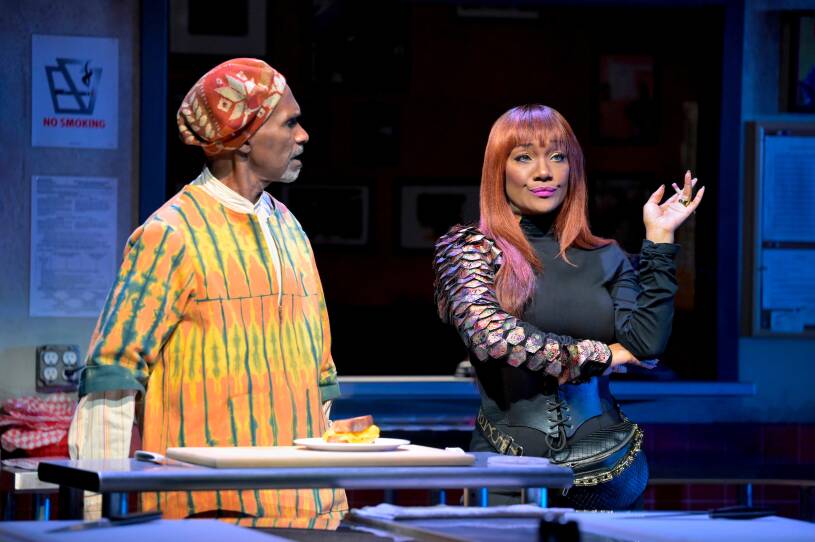Every week, GBH Executive Arts Editor Jared Bowen joins Boston Public Radio to break down the latest in arts headlines and share highlights from Boston's arts and culture scene. This week, we appreciate the local theater scene by way of the Elliot Norton Award nominations, local plays and a saga of sagas: The soap opera "General Hospital" turns 60.
Elliot Norton Awards
May 8 at the Huntington Theatre
The 40th Elliot Norton Award nominations were announced earlier this week. Described by Bowen as “the Boston version of the Tony Awards,” the awards celebrate local theater and is hosted by the Boston Theater Critics Association, of which Bowen is a part of. The ceremony is also officially gender-neutral for the first time this year .
Major standouts for this year’s nominations include productions of “Joe Turner’s Come and Gone,” and “K-I-S-S-I-N-G” at the Huntington, “The Inheritance” at SpeakEasy Stage Company, “Seven Guitars” from Front Porch Arts Collective, and “Don’t Eat the Mangoes” by Apollinaire Theatre Company and Teatro Chelsea.
The award is named for esteemed theater critic Elliot Norton. Norton “had a huge voice [when he] wrote for the Boston Herald,” and even hosted a show on GBH during a nearly 50-year career, interviewing the likes of Bob Hope and a young Al Pacino.
Wynwood Walls
Now on view in Miami
BPR host Jim Braude visited Miami recently and saw the Wynwood Walls district of the city. As Bowen explains, the project began years ago when “this area was transformed as artists took over and they began painting the walls, and it basically became this giant outdoor museum.” Now, “art lives and breathes there [...] it’s turned into this very magnetic neighborhood,” with dozens of murals around the area that visitors can admire.
Here in Boston, there's a similar boom in mural art. Local artist Rob “ProBlak” Gibbs created the “Breathe Life” series throughout Boston, the success of which has led to Gibbs being invited to work in other cities across the country. Bowen says that Gibbs “essentially has become an ambassador,” and that Boston is now “setting a national stage for public art in this country.”

"Clyde's"
Now playing at the Huntington Theatre through Apr. 23
Written by two-time Pulitzer Prize winner Lynn Nottage, "Clyde's" is set in the kitchen of the truck stop diner that gives the play its title. The play focuses on the stories of the incarcerated staff who work there. While writing this comedy, Nottage recycled interviews she had done with those reentering society after incarceration while researching her previous play, “Sweat.”
The driving question of the work is “what makes the ideal sandwich?” But, as Bowen explains, “what’s really happening here is you have these people come together — the sandwich is kind of a metaphor for how they reenter life.” The skills that go into crafting the perfect sandwich — collaboration, patience, tension, grace — are the same that go into finding one’s way back into society. Bowen applauds the “fantastic cast” that, along with Nottage’s writing, “makes [the characters] so magnetic that you’re completely invested in their lives and their situation by the end of the show.”

"Coriolanus"
Now playing at the Plaza Theatre at the Boston Center for the Arts presented by Actors Shakespeare Project through Apr. 23
This work is among Shakespeare’s plays wherein “nobody comes off well,” from society to government to the titular character. General Coriolanus has completely disregarded those who elected him to go off to war, and returns victorious and egotistical before the aristocratic tribunals cast him off. Coriolanus befriends the enemy, and returns for the audience to “see the worst parts of our society as rendered in this piece.”
The beauty of the work of Shakespeare is, as Bowen says, “that it always lives, it always breathes. We talk forever about how resonant Shakespeare is 400 years later, because the same themes in society” persist. However, this production is perhaps a “new version,” because it presents a new verse translation by Sean San José.
General Hospital Turns 60
The longest-running scripted soap opera on television celebrated its 60th anniversary recently. The show is known for launching the careers of multiple big names, including Meghan Markle, Demi Moore, Elizabeth Taylor, and Ricky Martin. Other famous faces, such as Bryan Cranston, credit appearances on soap operas as “great training ground for actors,” and the genre is often recalled fondly by those who remember their parents watching the serials in the 1960s and 1970s.
On a substantial level, soap operas are a microcosm of the way in which Bowen explains “pop culture and television shows and movies can move the needle on certain things.” Soap operas have historically dealt with such issues as AIDS, Alzheimer’s, mental illness, and queer identity in such ways that “it helped people to become familiar with these notions before they were comfortable in society.”










